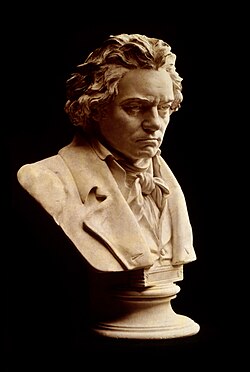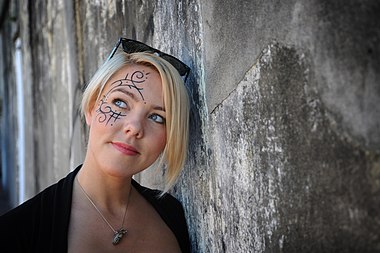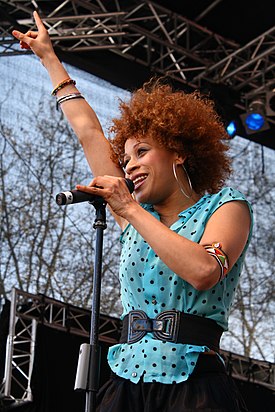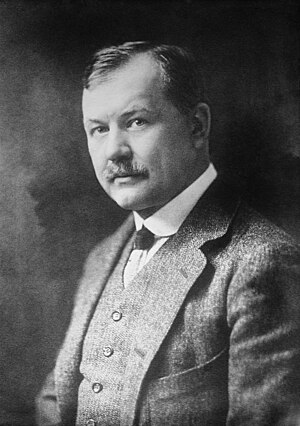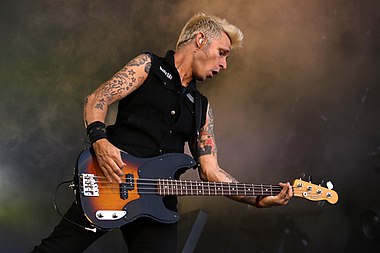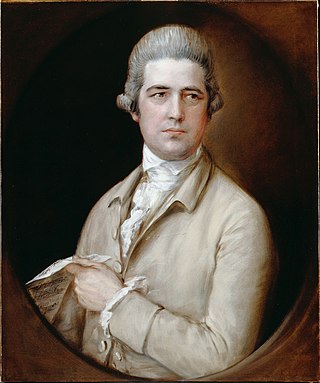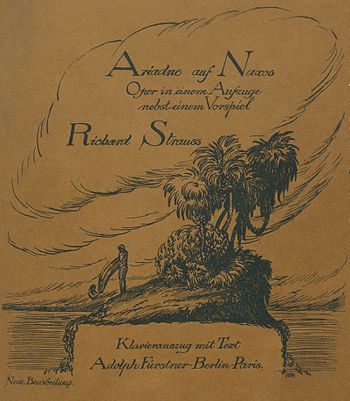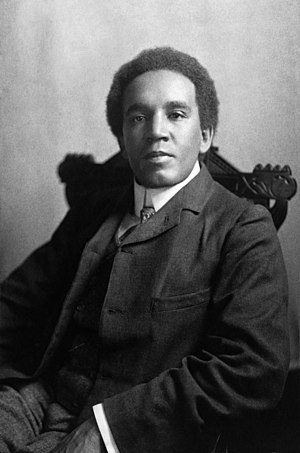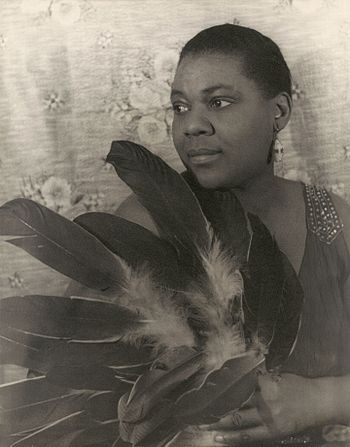Portal:Music/Selected picture
Appearance
Selected pictures list
Photo credit: Louis-Auguste Bisson
The only known photograph of Frédéric Chopin, often incorrectly described as a daguerreotype. It is believed to have been taken in 1849 during the degenerative stages of his tuberculosis, shortly before his death. Chopin, a Polish pianist and composer of the Romantic era, is widely regarded as one of the most famous, influential, admired and prolific composers for the piano. He moved to Paris at the age of twenty, adopting the French variant of his name, "Frédéric-François", by which he is now known.
Photo credit: New York World-Telegram and Sun
Louis Armstrong, nicknamed "Satchmo" or "Pops", was an American jazz trumpeter and singer. Armstrong was a foundational influence on jazz, shifting the music's focus from collective improvisation to solo performers. With his distinctive gravelly voice, Armstrong was also an influential singer, demonstrating great dexterity as an improviser and as a scat singer.
Photo: W. J. Mayer; Restoration: Lise Broer
A bust of the German composer and pianist Ludwig van Beethoven (1770–1827), made from his death mask. He was a crucial figure in the transitional period between the Classical and Romantic eras in Western classical music, and remains one of the most acclaimed and influential composers of all time. Born in Bonn, of the Electorate of Cologne and a part of the Holy Roman Empire of the German Nation in present-day Germany, he moved to Vienna in his early twenties and settled there, studying with Joseph Haydn and quickly gaining a reputation as a virtuoso pianist. His hearing began to deteriorate in the late 1790s, yet he continued to compose, conduct, and perform, even after becoming completely deaf.
Photo: Teemu Rajala
Vexi Salmi is a popular Finnish lyricist who has become popular through the successes of the platinum-selling music artists for whom he writes. During his prolific career, he has written the lyrics for over 4,000 songs, more than 2,400 of which have been recorded by prominent artists such as Irwin Goodman, Jari Sillanpää, and Katri Helena. A music writer's award, the Vexi Salmi Award, is named after him.
Hera is an Icelandic singer-songwriter who emigrated to New Zealand as a teenager. She is known for her facial art, which is "inspired by moko and also by Celtic warrior paint" and intended to represent both her Icelandic and New Zealand heritage. In 2002 she was named Best Female Singer at the Icelandic Music Awards.
Alexz Johnson (b. 1986) is a Canadian singer-songwriter and actress, best known for roles as Jude Harrison in the CTV series Instant Star (character shown here), Annie Thelan in the Disney Channel series So Weird, and as Erin Ulmer in the 2006 horror film Final Destination 3. Her album Voodoo was released in 2010.
Lina Rafn (b. 1976) is a Danish singer, songwriter and producer active with the band Infernal. She had previously been a VJ on the show The Voice TV Danmark.
Photo: ChrisHamburg
Oceana (born 1982) is a German singer of German/Martiniquen descent. She is shown here performing at the Radio Hamburg Top 820.
Manuscript: Alessandro Scarlatti
Griselda is an opera seria in three acts by the Italian composer Alessandro Scarlatti. First performed in 1721, it is based on the story of Patient Griselda from Giovanni Boccaccio's Decameron. The libretto is by Apostolo Zeno, with revisions by an anonymous author. This manuscript copy by Scarlatti, held at the British Library, is of act one, scene one.
Photograph: Stefan Krause
Henrik Freischlader (b. 1982) is a German blues guitarist and singer. He began his career in 1998, and established his own label, Cable Car Records, in 2009.
Photo: Benoît Derrier; edit: Keraunoscopia
Ane Brun (b. 1976) is a Norwegian songwriter, guitarist and vocalist. She has recorded eight albums, starting in 2003 with Spending Time with Morgan.
Photograph: Achim Raschka
Simon Neil (b. 1979) is a Scottish vocalist, guitarist, and songwriter. Born in Irvine, he established the band Biffy Clyro in 1995 with James and Ben Johnston. He has also played with JP Reid of Sucioperro in Marmaduke Duke, using the pseudonym "The Atmosphere", and started a solo career.
Photograph: Roland Fischer
The Zürich Opera House is an opera house in the Swiss city of Zürich. Located at the Sechseläutenplatz, it has been the home of the Zürich Opera since the current building was completed in 1891. It also houses the Bernhard-Theater Zürich.
Elvis Presley meets Richard Nixon
Photograph: Oliver F. AtkinsAmerican singer Elvis Presley meeting then-president Richard Nixon on December 21, 1970. During the meeting, the singer expressed his patriotism and his contempt for hippies, the growing drug culture, and the counterculture in general. Presley then asked Nixon for a Bureau of Narcotics and Dangerous Drugs badge, to signify official sanction of his patriotic efforts. Nixon gave Presley the badge and expressed a belief that Presley could send a positive message to young people and that it was therefore important he retain his credibility.
Illustration: Paul Gavarni; restoration: Adam Cuerden
L'éclair is an opéra comique in three acts by Fromental Halévy to a libretto by Jules-Henri Vernoy de Saint-Georges. Premiered by the Paris Opéra-Comique at the Salle de la Bourse on 16 December 1835, the opera was well received. It follows the amours of the Englishman George and the American Lyonel for two sisters, the bachelorette Henriette and the widow Mme. Darbel.
Photograph: Bain News Service; restoration: Adam Cuerden
Franz Lehár (1870–1948) was an Austro-Hungarian composer mainly known for his operettas, the most successful and best known being The Merry Widow. He also wrote sonatas, symphonic poems and marches.
Photograph: Ailura
Nina Sublatti (b. 1995) is a Georgian singer, songwriter, and model. Having previously won the 2013 Georgian edition of Idol, she achieved international attention when she represented her country in Eurovision Song Contest 2015 with her song "Warrior". She has since served as a judge on X Factor Georgia and Idols.
Photograph: Sven-Sebastian Sajak
Mike Dirnt (b. 1972) is an American musician, songwriter and composer. He is best known as the co-founder, bassist, backing and occasional lead vocalist of American punk rock band Green Day. He has played in several other bands, including The Frustrators.
Photograph: Georg Lindstrøm; restoration: Adam Cuerden
Carl Nielsen (1865–1931) was a Danish musician, conductor and violinist, widely recognized as his country's most prominent composer. Initially playing in a military band before attending the Royal Danish Academy of Music in Copenhagen, he premiered his Op. 1, Suite for Strings, in 1888, at the age of 23. His early music was inspired by composers such as Brahms and Grieg, but he soon developed his own style. By the time of his death, he had produced 419 known works; some of these, such as his opera Maskarade (1906), have become integral to Denmark's national heritage.
Photograph: Avinoam Michaeli
Aida is an opera in four acts by Giuseppe Verdi to an Italian libretto by Antonio Ghislanzoni. Set in the Old Kingdom of Egypt, it was commissioned by Cairo's Khedivial Opera House and had its première there on 24 December 1871, in a performance conducted by Giovanni Bottesini.
This picture shows the set for a performance of Aida by the Israeli Opera in 2011.
Photograph: Sven-Sebastian Sajak
Hayley Williams (born December 27, 1988) is an American singer, songwriter, musician, and businesswoman. She serves as the lead vocalist, primary songwriter and occasional keyboardist of the rock band Paramore. Born in Meridian, Mississippi, Williams moved to Franklin, Tennessee, at the age of fifteen after her parents divorced. In 2004, she formed Paramore alongside Josh Farro, Zac Farro, and Jeremy Davis. The band currently consists of Williams, Farro and Taylor York. They have released five studio albums: All We Know Is Falling (2005), Riot! (2007), Brand New Eyes (2009), Paramore (2013) and After Laughter (2017).
Graphic: Giuseppe Palanti
Médée is a French-language opera by the composer Luigi Cherubini. Set in the ancient city of Corinth, Greece, it features a libretto by François-Benoît Hoffman and is based on Euripides's tragic play Medea and Pierre Corneille's play Médée. The opera premiered in 1797 at the Théâtre Feydeau in Paris. The long-lost final aria, which Cherubini appears to have deleted from his original manuscript, was discovered by researchers from the University of Manchester and Stanford University by employing X-ray techniques to reveal areas that the composer had blackened out.
This picture shows the title page for a vocal score of the 1909 hybrid version of Médée.
Thomas Linley the elder (17 January 1733 – 19 November 1795) was an English bass singer and musician. He began his musical career at age 11 in Bath, becoming apprentice to the organist Thomas Chilcot. Linley married in 1752 and fathered eight children, supporting the family by working as a music teacher. As his children grew he developed their musical talent and was able to draw an increasing amount of income from their concerts. When the Bath Assembly Rooms opened in 1771, Linley became musical director and continued to promote his children's careers. He was eventually able to move to London with the thousands of pounds which he had amassed from their concerts. In addition to his children Linley taught tenor Charles Dignum, singer and actress Anna Maria Crouch, and novelist Frances Sheridan. He collaborated with his son Thomas Linley the younger in penning the comic opera The Duenna, with libretto by his son-in-law Richard Brinsley Sheridan.
This picture is an oil-on-canvas painting created around 1770 by Thomas Gainsborough, showing Linley holding his "Elegies for Three Voices". It hangs in the Dulwich Picture Gallery, London.
Illustration credit: unknown
Ariadne auf Naxos ('Ariadne on Naxos'), Op. 60, is an opera by Richard Strauss with a German libretto by Hugo von Hofmannsthal. Combining slapstick comedy and consummately beautiful music, the opera's theme is the competition between high and low art for the public's attention. The opera was originally conceived as a 30-minute divertissement to be performed at the end of Hofmannsthal's adaptation of Molière's play Le Bourgeois gentilhomme. Besides the opera, Strauss provided incidental music to be performed during the play. In the end, the opera was ninety minutes long, and the performance of the play and opera together totalled over six hours. It was first performed at the Staatsoper Stuttgart on 25 October 1912, directed by Max Reinhardt. The combination of the play and opera proved to be unsatisfactory to the audience: those who had come to hear the opera resented having to wait until the play finished. The work was revised in 1916, with the play being replaced by a prologue, and first performed at the Vienna State Opera on 4 October of that year.
This picture is the cover of a vocal score of the revised edition of Ariadne auf Naxos, published in 1916.
Drawing credit: Philippe Chaperon; restored by Adam Cuerden
Aida is a grand opera in four acts by Giuseppe Verdi to an Italian libretto by Antonio Ghislanzoni. Set in the Old Kingdom of Egypt, it was commissioned by Cairo's Khedivial Opera House and had its premiere there on 24 December 1871, in a performance conducted by Giovanni Bottesini. Today, the work holds a central place in the operatic canon, receiving performances every year around the world; at New York's Metropolitan Opera alone, Aida has been sung more than 1,100 times since 1886.
This picture is the set design for Act 1, Scene 2, of the opera's 1871 premiere, depicting the portico of the Temple of Vulcan, designed by Philippe Chaperon. The drawing is in the collection of the Bibliothèque nationale de France.
Photograph credit: Carl Van Vechten; restored by Adam Cuerden
William Grant Still (1895–1978) was an American composer of nearly 200 works, including five symphonies and nine operas. Often referred to as the "Dean of Afro-American Composers", Still was the first American composer to have an opera produced by the New York City Opera. His first symphony, entitled Afro-American Symphony, was until 1950 the most widely performed symphony composed by an American. Born in Mississippi, he grew up in Little Rock, Arkansas, attended Wilberforce University and Oberlin Conservatory of Music, and was a student of George Whitefield Chadwick and later Edgard Varèse. Still was the first African American to conduct a major American symphony orchestra and the first to have an opera performed on national television. Due to his close association and collaboration with prominent African-American literary and cultural figures, he is considered to be part of the Harlem Renaissance movement.
This picture of Still was taken by Carl Van Vechten in 1949; the photograph is in the collection of the Library of Congress in Washington, D.C.
Photograph credit: Eugène Pirou; restored by Adam Cuerden
Jules Massenet (12 May 1842 – 13 August 1912) was a French composer of the Romantic era, best known for his operas. Between 1867 and his death, he wrote more than forty stage works in a wide variety of styles, from opéra comique to grand depictions of classical myths, romantic comedies and lyric dramas, as well as oratorios, cantatas and ballets. Massenet had a good sense of the theatre and of what would succeed with the Parisian public. Despite some miscalculations, he produced a series of successes that made him the leading opera composer in France in the late 19th and early 20th centuries. By the time of his death, he was regarded as old-fashioned; his works, however, began to be favourably reassessed during the mid-20th century, and many have since been staged and recorded. This photograph of Massenet was taken by French photographer Eugène Pirou in 1875.
Photograph credit: unknown; restored by Adam Cuerden
Samuel Coleridge-Taylor (15 August 1875 – 1 September 1912) was an English composer and conductor. His greatest success was his cantata Hiawatha's Wedding Feast. This set the epic poem The Song of Hiawatha by Henry Wadsworth Longfellow to music, and was widely performed by choral groups in England and the United States. Composers were not well paid; the work sold hundreds of thousands of copies, but he had sold the music outright for the sum of 15 guineas, so did not benefit directly. He learned to retain his rights and earned royalties for other compositions after achieving wide renown, but always struggled financially. This photograph of Coleridge-Taylor was taken around 1905.
Painting credit: Anthony van Dyck
Nicholas Lanier (baptised 10 September 1588 – buried 24 February 1666) was an English composer and musician; the first to hold the title of Master of the King's Music, in the service of Charles I and Charles II. He was one of the first composers to introduce monody and recitative to England.
After this oil-on-canvas portrait was painted by the Flemish painter Anthony van Dyck in Antwerp, Lanier convinced the king to bring van Dyck to England, where he became the leading court painter. The portrait displays an attitude of studied carelessness, often termed sprezzatura, defined as "a certain nonchalance, so as to conceal all art and make whatever one does or says appear to be without effort and almost without any thought about it". The painting now hangs in the Kunsthistorisches Museum in Vienna.
Photograph credit: Carl Van Vechten; restored by Adam Cuerden
Bessie Smith (April 15, 1894 – September 26, 1937) was an American blues singer widely renowned during the Jazz Age. She is often regarded as one of the greatest singers of her era and was a major influence on fellow blues singers, as well as jazz vocalists.
Born in Chattanooga, Tennessee, her parents died when Smith was young, and she and her sister survived by performing on the streets of Chattanooga, Tennessee. She began touring and performed in a group that included Ma Rainey, and then went out on her own. Her successful recording career began in the 1920s, until an automobile accident ended her life at age 43.
Photograph credit: William P. Gottlieb; restored by Adam Cuerden
Thelonious Monk (October 10, 1917 – February 17, 1982) was an American jazz pianist and composer, and the second-most-recorded jazz composer after Duke Ellington. He had a unique improvisational style and famously remarked, "The piano ain't got no wrong notes". He made numerous contributions to the standard jazz repertoire, including "'Round Midnight", and a wide range of other compositions. He was renowned for a distinctive dress style, which included suits, hats, and sunglasses. He had disappeared from the scene by the mid-1970s and made only a few appearances during the final decade of his life. This 1947 photograph of Monk was taken by the American photographer William P. Gottlieb in Minton's Playhouse, a jazz club in New York.
Photograph credit: Fritz Luckhardt; restored by Adam Cuerden
Johann Strauss II (25 October 1825 – 3 June 1899) was an Austrian composer of light music, particularly dance music and operettas. Part of the Strauss dynasty, his father demanded that none of his sons pursue music as a career, despite their display of musical talent. It was only after his father had abandoned the family for a mistress that the younger Strauss was able to develop his skills as a composer, with the encouragement of his mother. He eventually attained greater fame than his father, and became one of the most popular waltz composers of the era, conducting extensive tours of Austria, Poland and Germany with his orchestra.
Photograph credit: William P. Gottlieb; restored by Adam Cuerden
Billy Strayhorn (November 29, 1915 – May 31, 1967) was an American jazz composer, pianist, lyricist, and arranger, best remembered for his long-time collaboration with bandleader and composer Duke Ellington that lasted nearly three decades. Though classical music was Strayhorn's first love, his ambition to become a classical composer went unrealized because of the harsh reality of a black man trying to make his way in the world of classical music, which at that time was almost completely white. He was introduced to the music of pianists like Art Tatum and Teddy Wilson at age 19, and the artistic influence of these musicians guided him into the realm of jazz, where he remained for the rest of his life. This photograph of Strayhorn was taken by William P. Gottlieb in the 1940s.
Illustration credit: Carlos Schwabe; restored by Adam Cuerden
Fervaal is an opera with a prologue and three acts by the French composer Vincent d'Indy. Fervaal is the son of a Celtic king and is destined to be the last advocate of the old gods. His mission is to save his homeland from invasion and pillage, but in doing so he must renounce love. This illustration, by the Swiss painter Carlos Schwabe, relates to the 10 May 1898 premiere of the opera at the Théâtre de l'Opéra-Comique in Paris. Here, Fervaal is depicted ascending a mountain while carrying the body of his beloved Guilhen at the end of the opera, as the pagan gods and their worshippers fade out of existence with the dawn of Christianity.
Illustration credit: Antoine Barbizet; restored by Adam Cuerden
Les Troyens (The Trojans) is a French grand opera in five acts by Hector Berlioz, with a libretto written by the composer himself based on Virgil's Aeneid. The score was composed between 1856 and 1858, but Berlioz did not live long enough to see the work performed in its entirety. The first two acts were performed separately under the title La Prise de Troie. This picture shows the cover of the first-edition vocal score for La Prise de Troie, published in 1863.
Poster credit: Alfredo Leonardo Edel; restored by Adam Cuerden
Le mage is an opera in five acts by Jules Massenet to a French libretto by Jean Richepin. First performed at the Paris Opera in 1891, it has rarely been performed since its premiere run of 31 performances, and is one of Massenet's least-known operas. A rare complete concert performance took place at the Massenet Festival in Saint-Étienne in 2012. This poster by Alfredo Edel was produced for the opera's premiere on 16 March 1891.
Photograph credit: William P. Gottlieb; restored by Adam Cuerden
Mary Lou Williams (May 8, 1910 – May 28, 1981) was an American jazz pianist, arranger, and composer. She wrote hundreds of compositions and arrangements and recorded more than one hundred records. Williams wrote and arranged for Duke Ellington and Benny Goodman, and she was friend, mentor and teacher to numerous other jazz musicians. The second of eleven children, she was born in Atlanta, Georgia, and grew up in the East Liberty neighborhood of Pittsburgh, Pennsylvania. A young musical prodigy, she taught herself to play the piano at the age of three. This photograph of Williams at the piano was taken by William P. Gottlieb around 1946.
Photograph credit: Jean Reutlinger; restored by Adam Cuerden
Nelly Martyl (1884–1953) was a French opera singer. She sang in the premieres of several operas, including Leborne's La Catalane (1907), Erlanger's La Sorcière (1912), and Massenet's Amadis (1922). Martyl joined the Red Cross as a nurse during the First World War, and served at the Battle of Verdun in 1916, where she was known as la fée de Verdun (the Fairy of Verdun), and at the Second Battle of the Aisne in 1917. She continued as a nurse after the war to help with the 1918 epidemic of Spanish flu. She was awarded the Croix de Guerre with the carte du combattant (signifying service under particular hazard) in 1920.
The Selected picture box on the portal chooses one of the following at random when displaying the page. Follow the instructions below for adding or nominating a new picture to the list.
Picture candidates
[edit]Feel free to add related featured pictures to the list. Nominate other pictures on the portal talk page.
- Pictures must be
- Free to use and hosted on Commons
- Of good quality (not blurred, grainy or discoloured)
- Interesting
- Relevant to an article or topic
To find appropriate pictures, use search box below:
Instructions
[edit]- For pictures, which appeared as picture of the day on the Main Page, just add the date in
YYYY-MM-DDformat to the list (please keep the list sorted). - For other pictures, use following parameters:
|iN= |titleN= |creditN= |captionN=
where N is the next unused number.



